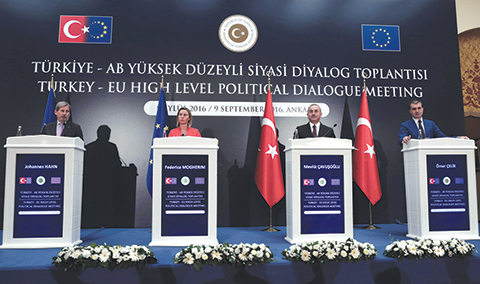 European Union's Foreign Policy Chief Federica Mogherini, second left, EU Enlargement Commissioner Johannes Hahn, left, Turkey's Foreign Minister Mevlut Cavusoglu, second right, and Turkey's EU Minister Omer Celik speak to the media after their talks in Ankara, Turkey, Friday, Sept. 9, 2016. Mogherini says the 28-member bloc and Turkey agree that there can be no military solution to the Syrian conflict and that only a political solution can bring peace to the war-torn country.-AP Photo
European Union's Foreign Policy Chief Federica Mogherini, second left, EU Enlargement Commissioner Johannes Hahn, left, Turkey's Foreign Minister Mevlut Cavusoglu, second right, and Turkey's EU Minister Omer Celik speak to the media after their talks in Ankara, Turkey, Friday, Sept. 9, 2016. Mogherini says the 28-member bloc and Turkey agree that there can be no military solution to the Syrian conflict and that only a political solution can bring peace to the war-torn country.-AP PhotoANKARA: Turkey and the European Union yesterday agreed to ease tensions that had darkened Ankara's prospects of joining the bloc in the wake of the failed July 15 coup. EU foreign policy chief Federica Mogherini and Enlargement Commissioner Johannes Hahn-making the highest-level EU visit to Turkey since the coup-said that new chapters in Ankara's long-running accession process should be opened and that visa liberalization was still on the table.
Several Turkish and EU officials had engaged in a war of words after the attempted putsch, with Brussels slamming the ensuing crackdown and Ankara unhappy with an apparent lack of solidarity from the bloc. "The key element which we agreed to was that we talk more to each other and a little bit less about each other, showing full respect," Mogherini said after talks with Turkey's Foreign Minister Mevlut Cavusoglu and EU Minister Omer Celik. Mogherini unequivocally condemned the coup aimed at ousting President Recep Tayyip Erdogan, saying: "There is no space whatsoever... for any attempt at a coup."
She said the sides had an "in-depth discussion" about ensuring the rule of law was protected following criticism of the crackdown in which tens of thousands of people have been arrested or dismissed over alleged links to the putsch. She said the main outcome of the meeting was "a strong recommitment to dialogue and common work on all strands of our cooperation." Cavusoglu added: "We must work together because there are problems that emerge that affect all our people. If there is a problem, we must mutually solve it."
'A candidate country'
Hahn acknowledged there had been "many irritations" on both sides following the coup, emphasising that Turkey had to behave in a manner befitting of a candidate member. "Turkey was, is and will be a candidate country. And as a candidate country we have to apply higher standards." Turkey's bid to join the EU dates back to the 1960s with formal talks starting in 2005 but the duration of the process has caused severe rancor in Ankara.
After the attempted coup, Erdogan mulled bringing back capital punishment, a move which would spell an end to the bid. The issue of the death penalty was not raised at the press conference. Hahn emphasized that visa liberalization for Turks travelling to the EU-which Ankara wants completed this year-was still on the agenda. He said chapters 23 and 24 of the accession process-covering justice and rights and freedom and security-should be opened as soon as possible and that a settlement to end the division of Cyprus would help this. Celik said Ankara was ready to open all 35 chapters of the EU accession process. So far, only 16 chapters have been opened. "Turkey is a European country, a European democracy. Europe's future is our future," he said.
'Strong Turkey essential'
The unresolved situation in Cyprus-which is divided between the Greek-ruled, internationally-recognized south and the Turkish north-remains a huge obstacle to Turkey's membership bid, with the Republic of Cyprus blocking the opening of several new chapters. Mogherini said there was a "window" of hope for Cyprus and expressed confidence there would be a solution "in the near future".
She said the issue of visa liberalization had been raised in "constructive" talks with Erdogan at the G20 in China. Later yesterday, Cavusoglu was to meet with NATO Secretary General Jens Stoltenberg, who is also making his first visit to Turkey since the attempted putsch. Turkey joined the Western military alliance in 1952 shortly after World War II, at the start of the Cold War. Its membership has traditionally been a cornerstone of Turkish foreign policy. After meeting Erdogan late on Thursday, Stoltenberg said a "strong and democratic Turkey is essential for the stability and security of Europe and the region," according to a statement released by NATO. - AFP










